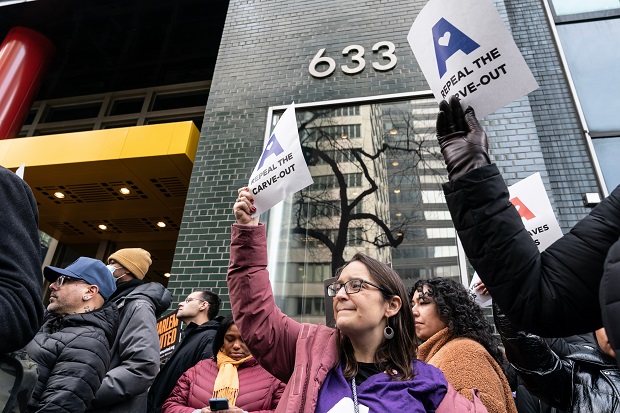bulletin news online news
By Caroline Catherman
Orlando Sentinel
(TNS) Charlotte Douberley, a 2-year-old with cystic fibrosis, lost Medicaid coverage almost a year before she was supposed to, according to Florida’s plan. online news
The Duval County toddler has been without health insurance since May 31. Since then, she’s racked up thousands of dollars in medical bills.
She was recently approved for MediKids, a low-cost state program for children whose families make too much for Medicaid, but her coverage doesn’t start until Saturday. Her supply of a vital, $26,000-a-month medication runs out Thursday, and her pharmacy is unwilling to order a refill until she has insurance again.
“I’ve just been calling everybody that I can, any resource,” said Charlotte’s mother, Chianne Douberley. “I feel drained.”
Florida purged about 300,000 residents from its Medicaid rolls in April and May, after the end of a COVID-era policy that banned states from dropping people from the program for low-income children, families and young adults. Charlotte wasn’t expected to be one of them.
Charlotte meets the American Academy of Pediatrics’ definition of medically complex. The Department of Children and Families published a plan earlier this year vowing to postpone Medicaid redeterminations for medically complex kids under 21 until the end of the Medicaid unwinding in Spring 2024. But that isn’t what happened, according to some providers and advocates.
“You never want a child’s coverage to be interrupted. But for these kids and their families, it’s catastrophic,” said Miriam Harmatz, founder and director of advocacy for the Florida Health Justice Project. “Kids who have multiple comorbidities or serious life-threatening illnesses like Charlotte’s cystic fibrosis … they cannot go without coverage.”
bulletin news online news
Medicaid paid for all expenses related to Charlotte’s specialty medical daycare, breathing machine and medications that helped her gain weight, get energy, protect her immune system and help her lungs function.
The family has received some relief from the state’s medically needy program, which covers medical costs when they exceed a certain amount proportional to a family’s income. But the family’s limit of $4,800 is still daunting, Douberley said, especially considering she has an infant and her husband is the only one working right now.
Harmatz and her team have publicized several cases and contacted the Florida Department of Children and Families on behalf of Charlotte and a few other medically complex children. Harmatz said she hasn’t heard back about Charlotte’s case, but DCF has resolved other cases that she’s brought to its attention.
There is no legal requirement for the state to adhere to its prioritization schedule, which makes it difficult to enforce, she added. She proposes that the problem needs to be resolved through widescale reform, not on a case-by-case basis.
“When you see one, you assume it’s happening more,” Harmatz said. “Our Florida Health Justice Project is tiny, and we’re one of the few organizations I know that’s, you know, digging into someone’s files and getting the consents and publishing stories and following up.”
DCF did not respond by deadline to questions from the Orlando Sentinel about the issue.
This is just one of many complaints that have come forward during the Medicaid redetermination process.
Before dropping people from Medicaid, Florida DCF states that it contacts them multiple times through texts, letters, emails and phone calls. Instructions on how to renew coverage are supposed to arrive 45 days before someone’s renewal date.
Despite this, about 65% of people terminated in Florida lost coverage because of procedural reasons such as failing to respond or omitting required documents, according to the Kaiser Family Foundation’s analysis of state data.
Many, like Charlotte’s mom Douberley, have never before gone through the redetermination process for Medicaid.
Douberley said the communication around this change was confusing, and she received contradictory guidance when she called DCF. She didn’t get confirmation that Charlotte’s case had been reviewed until two days before she lost coverage.
“I’ve never gone through a redetermination before. As far as I knew, all I had to do is enter in my child’s information, and then she would be covered. And in my mind, it was like, why wouldn’t she be covered?” Douberley said.
In response to a high proportion of procedural terminations nationwide, Xavier Becerra, secretary of the Department of Health and Human Services, urged state governors to shape up their renewal process in a June letter.
“I am deeply concerned with the number of people unnecessarily losing coverage, especially those who appear to have lost coverage for avoidable reasons that State Medicaid offices have the power to prevent or mitigate,” he wrote.
The federal government has the authority to request that specific states pause terminations, and Becerra said HHS will “not hesitate” to use it.
©2023 Orlando Sentinel. Visit at orlandosentinel.com. Distributed by Tribune Content Agency, LLC.
© Copyright 2023 Tribune Content Agency. All Rights Reserved
bulletin news online news


